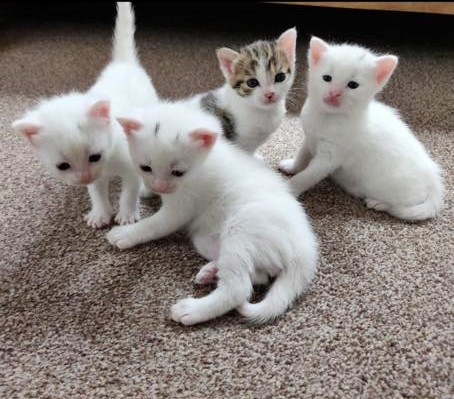RSPCA centres take in three cats every hour
Date published: 13 May 2019

Three-week-old kittens at Bluebell Cat Rescue in Littleborough
RSPCA centres take in three cats every hour on average, latest figures reveal.
Last year, the RSPCA centres and branches took in 28,986 cats. While, over the last three years, more than 90,000 have been brought in, in total.
The RSPCA rescues more cats than any other animal, rescuing more than 22,000 felines in 2018. The charity also received more than 150,000 cat-related calls last year – the equivalent of 18 calls every hour.
Most kittens are typically born between April and September, meaning during the ‘kitten season’, rescues like the RSPCA end up with large amounts of young cats coming into their care.
July sees the most cats coming into the RSPCA centres and branches, with:
- 2,622 in 2018
- 3,386 in 2017
- 3,143 in 2016 - during the one-month period.
A shocking peak in abandonments has been seen over the summer period with 58 percent more cats being dumped in July last year compared to January.
Carrie Stones, the RSPCA's cat population control manager, said: “With an average of 86 cats coming into our care every day and a peak in the number of abandoned cats reported to us in summer - it’s clear that the UK is facing a cat overpopulation crisis with so many cats ending up in rescue centres.
“We would always urge people to think about the long-term commitment that caring for a cat entails and to avoid making a snap decision about whether to take on a cat or kitten, for example, from family or friends or buying online.
“Sadly, we see so many litters of kittens dumped like rubbish in the summer months because often owners have made this quick decision and can no longer cope, or the kittens have been an unplanned litter and a shock to the owner of the moggy mum.
“There’s no denying that kittens look cute but the reality of caring for them can be hard work, time consuming and costly. We, and other cat and vet organisations believe the solution to this crisis is to neuter cats from four months old.”
Kittens should be neutered from four months old to avoid unplanned litters and reduce the thousands of cats who end up in the care of the RSPCA and other charities and rescues.
Neutering cats from four months old – the same age as when a female cat can become pregnant – rather than the traditional six months will have a significant impact on the number of unplanned litters, and therefore reduce the large number of homeless cats.
A 2018 report by PDSA Animal Wellbeing revealed that 9% of cats are not neutered - equating to 999,000 unneutered cats in the UK.
The top reasons for not neutering included that the owner hadn’t thought about it (24%), that the cat doesn’t go outside (15%), and they were too young (15%).
Last year’s PDSA report also found that 13% of owners of female cats said that their cat had at least one litter and 70% of those owners said that their cat’s pregnancy was unplanned.
Cats Protection claims, in a period of only five years, a single female cat, producing three litters per year, with an average of four to six kittens per litter, can be responsible for 20,000 descendants.
Female cats that are spayed before their first heat will have a reduced chance of mammary cancer, and will be unable to develop pyometra, which is a serious uterine condition that can cause death. Also, an unwanted pregnancy in an already ill or aging cat can be fatal.
Male cats which have been neutered have less chance of being injured in fights over females, of developing prostate problems, and of catching feline immunodeficiency virus (FIV), an incurable disease similar to HIV in humans
FIV is spread through saliva and is usually contracted through bite wounds during fights: neutering cats reduces their urge to roam and fight so they’re less likely to go missing, get hit by cars, or get hurt.
Help with neutering
Check with your local RSPCA branches - they can offer different levels of financial assistance.
Rochdale Branch currently offer neutering vouchers: £20 towards male cats / £30 female cats (subject to eligibility).
Subsidised veterinary care is also offered by Greater Manchester Animal Hospital in Salford and by occasional mobile clinics.
Cats Protection also routinely offers financial assistance towards neutering costs through their means-tested neutering scheme, so that neutering can cost as little as £10.
To see if you are eligible for financial assistance, contact the Cats Protection national neutering team (Mon-Fri 9.30am-1pm) on 03000 12 12 12 or email the Rochdale Branch: rochdalecats@hotmail.co.uk
If you are eligible for a Cats Protection voucher, Bluebell Cat Rescue in Littleborough can offer free help with pre and post-operative advice, and also with taking your cat to or from a neutering operation: bluebellcatrescue@gmail.com
Do you have a story for us?
Let us know by emailing news@rochdaleonline.co.uk
All contact will be treated in confidence.
Most Viewed News Stories
- 1Royton haulage firm fined after Rochdale dad went to work and didn’t come home
- 2Six men arrested in Rochdale child exploitation investigation
- 3Newhey's Char Steakhouse and Bank Chamber close with immediate effect
- 4Two men arrested after police chase ends up in Middleton river
- 5Obituary: Jean Ashworth
To contact the Rochdale Online news desk, email news@rochdaleonline.co.uk or visit our news submission page.
To get the latest news on your desktop or mobile, follow Rochdale Online on Twitter and Facebook.


